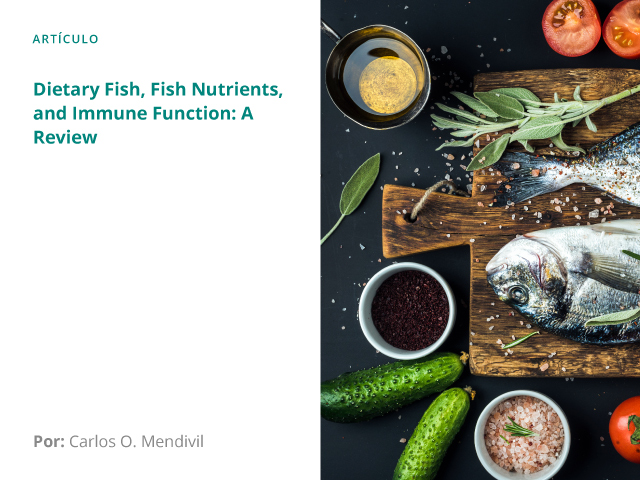[Articulo] Los invitamos a consultar esta publicación que contó con la participación de nuestro profesor titular, Dr. Carlos Mendivil.
Dietary habits have a major impact on the development and function of the immune system. This impact is mediated both by the intrinsic nutritional and biochemical qualities of the diet, and by its influence on the intestinal microbiota. Fish as a food is rich in compounds with immunoregulatory properties, among them omega-3 fatty acids, melatonin, tryptophan, taurine and polyamines. In addition, regular fish consumption favors the proliferation of beneficial members of the intestinal microbiota, like short-chain fatty acid-producing bacteria. By substituting arachidonic acid in the eicosanoid biosynthesis pathway, long-chain omega-3 fatty acids from fish change the type of prostaglandins, leukotrienes and thromboxanes being produced, resulting in anti-inflammatory properties. Further, they also are substrates for the production of specialized pro-resolving mediators (SPMs) (resolvins, protectins, and maresins), lipid compounds that constitute the physiological feedback signal to stop inflammation and give way to tissue reparation.Evidence from human observational and interventional studies shows that regular fish consumption is associated with reduced incidence of chronic inflammatory conditions like rheumatoid arthritis, and that continuous infusion of fish oil to tube-fed, critically ill patients may improve important outcomes in the ICU. There is also evidence from animal models showing that larger systemic concentrations of omega-3 fatty acids may counter the pathophysiological cascade that leads to psoriasis. The knowledge gained over the last few decades merits future exploration of the potential role of fish and its components in other conditions characterized by deregulated activation of immune cells and a cytokine storm like viral sepsis or COVID-19.













